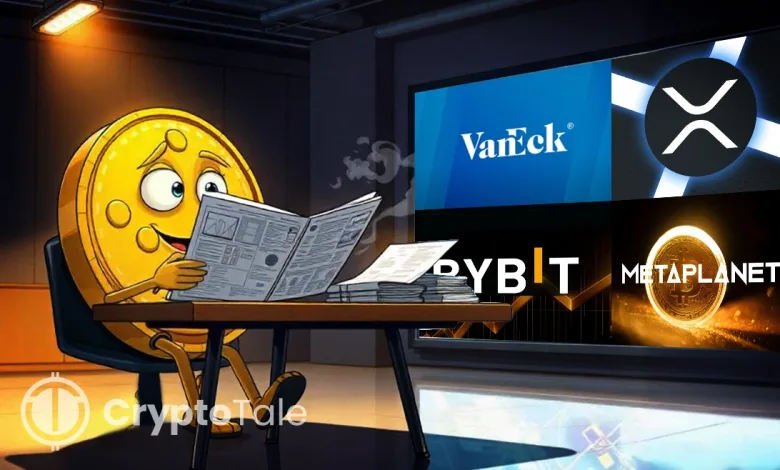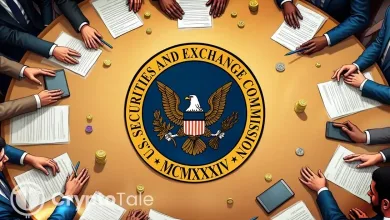The Blockchain Bulletin, Apr 3: VanEck Files For Its First U.S. BNB ETF Proposal

Hey folks! Welcome to the latest edition of The Blockchain Bulletin. Here is a glance at the significant developments that took place in the crypto world over the last 24 hours. VanEck, a leading asset management firm, has filed to register a BNB exchange-traded fund (ETF) in Delaware, marking the first attempt to launch a spot BNB ETF in the United States.
The product would track the price of Binance Coin (BNB) and offer regulated exposure to its performance without requiring users to handle the asset directly. This latest move becomes VanEck’s fifth crypto asset ETF filing. The company has built a notable history in this space, beginning with its Bitcoin futures ETF filing in 2017.
In 2024, it received SEC approval for a Bitcoin ETF, becoming one of the first providers to achieve this. The firm also filed for a Solana ETF in June 2024 and a spot Ethereum ETF in July of the same year. Last month, VanEck submitted a proposal for an Avalanche (AVAX) ETF, highlighting its continued focus on expanding digital asset access through regulated financial instruments.
While institutional interest remains active, large-scale blockchain movements have sparked speculation. Blockchain tracking services recorded two XRP transfers totaling 500 million tokens, worth approximately $1.05 billion, from unidentified wallets to Ripple. This was followed by Ripple placing 700 million XRP into escrow accounts. The size and timing of the transactions stirred discussions in the community, especially given Ripple’s structured monthly escrow releases and buyback history.
These events unfolded just as China revealed a major step in digital data security. On April 2, Li Chunlin, Deputy Director of the National Development and Reform Commission, announced the integration of blockchain and privacy computing technologies to strengthen the security of credit information systems. The plan involves advanced encryption methods that allow sensitive financial data to be processed without exposing personal identifiers, helping reduce leakage risks while supporting the country’s broader digital governance initiatives.
Related: Metaplanet Buys 160 BTC, Expands Bitcoin Treasury Holdings
Meanwhile, Binance is once again under scrutiny, with the hashtag #BoycottBinance trending on X. Users accused the platform of manipulating altcoin prices through its futures market, claiming that Binance exploits its market position to impact price action and liquidate long positions on less active tokens. The DXC Foundation publicly called on users to withdraw funds from the exchange, alleging intentional manipulation of market trends. Despite user backlash, Binance has not yet responded to these accusations.
In contrast to the turbulence, Sony Electronics in Singapore announced that it would begin accepting USDC payments through integration with Crypto.com’s payment system. As of April 2, Sony became the first major consumer electronics brand in Singapore to adopt stablecoin payments, a move that signals increasing stablecoin utility in traditional retail sectors.
GameStop Corp. disclosed on April 2 that it had completed a $1.5 billion private offering of convertible senior notes due 2030. This included an additional $200 million in notes, exercised by the first purchaser. Of the $1.48 billion in net proceeds, a portion will be allocated to Bitcoin acquisition, following an update to the company’s investment policy.
While GameStop moves deeper into crypto, Bybit announced it will shut down its NFT Marketplace, Inscription Marketplace, and IDO platform on April 8, 2025. The decision followed low user activity and trading volumes, with the company advising users to transfer assets before the deadline.
Related: Bitcoin to Reach $250,000 as Fed’s QE and Liquidity Increase
Meanwhile, the SEC and Gemini jointly requested a 60-day pause in their ongoing court case concerning Gemini’s Earn program to explore a potential resolution. BlackRock also marked a regulatory win, registering with the UK’s Financial Conduct Authority as a crypto asset firm, which enables its European Bitcoin ETP rollout via a UK-based entity.
In India, tax authorities began investigating Binance users who failed to comply with the 1% TDS rule on crypto transactions. The scrutiny targets offshore exchanges operating within the country’s jurisdiction. Lastly, Jetking Infotrain Ltd. raised ₹6.6 crore to support its digital asset initiative, which focuses on Bitcoin acquisition and blockchain education, according to CFO Siddarth Bharwani.
Related: Neuralink Expands Global Search for Patients to Test Brain Chip
The developments reflect an evolving digital asset landscape, where traditional institutions, global regulators, and technology firms continue to shape crypto adoption. From VanEck’s expanding ETF strategy to regulatory shifts in China, the push for transparency and integration is clear. As firms adjust policies, invest in infrastructure, or shut down underused services, the market continues to mature—driven by innovation, compliance pressures, and growing demand for secure and efficient digital asset solutions.




